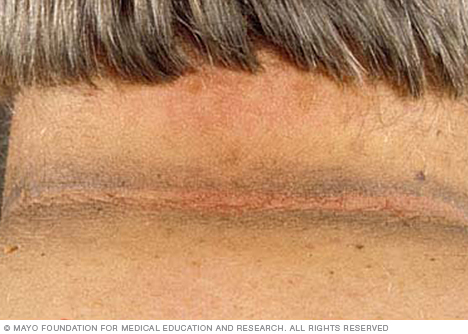Overview
Acanthosis nigricans

Acanthosis nigricans
Acanthosis nigricans is a skin condition that causes a dark discoloration in body folds and creases. It typically affects the armpits, groin and neck.
Acanthosis nigricans is a condition that causes areas of dark, thick velvety skin in body folds and creases. It typically affects the armpits, groin and neck.
Acanthosis nigricans (ak-an-THOE-sis NIE-grih-kuns) tends to affect people with obesity. Rarely, the skin condition can be a sign of cancer in an internal organ, such as the stomach or liver.
Treating the cause of acanthosis nigricans might restore the usual color and texture of the skin.
Products & Services
Symptoms
The main sign of acanthosis nigricans is dark, thick, velvety skin in body folds and creases. It often appears in the armpits, groin and back of the neck. It develops slowly. The affected skin might be itchy, have an odor and develop skin tags.
When to see a doctor
Consult your health care provider if you notice changes in your skin — especially if the changes are sudden. You may have an underlying condition that needs treatment.
Causes
Acanthosis nigricans might be related to:
- Insulin resistance. Most people who have acanthosis nigricans have also become resistant to insulin. Insulin is a hormone secreted by the pancreas that allows the body to process sugar. Insulin resistance is what leads to type 2 diabetes. Insulin resistance is also related to polycystic ovarian syndrome and might be a factor in why acanthosis nigricans develops.
- Certain drugs and supplements. High-dose niacin, birth control pills, prednisone and other corticosteroids may cause acanthosis nigricans.
- Cancer. Some types of cancer cause acanthosis nigricans. These include lymphoma and cancers of the stomach, colon and liver.
Risk factors
The risk of acanthosis nigricans is higher in people who have obesity. The risk is also higher in people with a family history of the condition, especially in families where obesity and type 2 diabetes are also common.
Complications
People who have acanthosis nigricans are much more likely to develop type 2 diabetes.
June 02, 2022
- AskMayoExpert. Polycystic ovary syndrome. Mayo Clinic; 2021.
- Kang S, et al., eds. Hypermelanoses. In: Fitzpatrick's Dermatology. 9th ed. McGraw Hill; 2019. https://accessmedicine.mhmedical.com. Accessed April 4, 2022.
- Niacinamide. Natural Medicines. https://naturalmedicines.therapeuticresearch.com. Accessed April 4, 2022.
- Gibson LE. Acanthosis nigricans. Mayo Clinic Proceedings. 2004; doi:10.4065/79.12.1571.
- Dinulos JGH. Cutaneous manifestations of internal disease. In: Habif's Clinical Dermatology. 7th ed. Elsevier; 2021. https://www.clinicalkey.com. Accessed April 4, 2022.
- Thoenes MM. Acanthosis nigricans: An opportunity for intervention. Journal for Nurse Practitioners. 2012; doi:10.1016/j.nurpra.2012.04.010.
- Kang S, et al., eds. Diabetes and other endocrine diseases. In: Fitzpatrick's Dermatology. 9th ed. McGraw Hill; 2019. https://accessmedicine.mhmedical.com. Accessed April 4, 2022.
Related
Products & Services